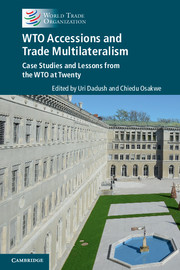Book contents
- Frontmatter
- Dedication
- Contents
- List of contributors
- Foreword
- Acknowledgements
- List of abbreviations
- Editors' note
- PART I WTO accessions, the trading system and the global economy
- PART II Overview: systemic outcomes from accessions
- PART III Members’ perspectives on accession negotiations
- PART IV Working party chairpersons’ perspectives on accession negotiations
- PART V Salient features inWTOAccession Protocols
- 29 Market access goods negotiations: salience, results and meaning
- 30 Services market opening: salience, results and meaning
- 31 WTO accession and the private sector: the nexus of rules and market opportunities
- 32 WTO accession and accession to the Agreement on Government Procurement: what is the relationship? Why should WTO acceding governments also consider GPA accession?
- 33 Energy-related rules in Accession Protocols: where are they?
- 34 Domestic framework for making and enforcing policies
- 35 Export duty commitments: the treaty dialogue and the pattern of commitments
- 36 Disciplining state trading practices: lessons from WTO accession negotiations
- 37 Intellectual property rights protection: the plus/minus debate from a least-developed country perspective – sense and nonsense
- 38 The future of multilateral investment rules in the WTO: contributions from WTO accession outcomes
- 39 Sanitary and phytosanitary measures: trends in accession plurilateral negotiations
- 40 Strengthening transparency in the multilateral trading system: the contribution of the WTO accession process
- PART VI Conclusion
- Annex: Contributor biographies
- Index
- Plate section
- References
32 - WTO accession and accession to the Agreement on Government Procurement: what is the relationship? Why should WTO acceding governments also consider GPA accession?
from PART V - Salient features inWTOAccession Protocols
Published online by Cambridge University Press: 05 November 2015
- Frontmatter
- Dedication
- Contents
- List of contributors
- Foreword
- Acknowledgements
- List of abbreviations
- Editors' note
- PART I WTO accessions, the trading system and the global economy
- PART II Overview: systemic outcomes from accessions
- PART III Members’ perspectives on accession negotiations
- PART IV Working party chairpersons’ perspectives on accession negotiations
- PART V Salient features inWTOAccession Protocols
- 29 Market access goods negotiations: salience, results and meaning
- 30 Services market opening: salience, results and meaning
- 31 WTO accession and the private sector: the nexus of rules and market opportunities
- 32 WTO accession and accession to the Agreement on Government Procurement: what is the relationship? Why should WTO acceding governments also consider GPA accession?
- 33 Energy-related rules in Accession Protocols: where are they?
- 34 Domestic framework for making and enforcing policies
- 35 Export duty commitments: the treaty dialogue and the pattern of commitments
- 36 Disciplining state trading practices: lessons from WTO accession negotiations
- 37 Intellectual property rights protection: the plus/minus debate from a least-developed country perspective – sense and nonsense
- 38 The future of multilateral investment rules in the WTO: contributions from WTO accession outcomes
- 39 Sanitary and phytosanitary measures: trends in accession plurilateral negotiations
- 40 Strengthening transparency in the multilateral trading system: the contribution of the WTO accession process
- PART VI Conclusion
- Annex: Contributor biographies
- Index
- Plate section
- References
Summary
ABSTRACT
The WTO Agreement on Government Procurement (GPA) is unique in its duality as an international trade agreement that promotes and preserves market opening and as an instrument for the promotion of good governance. The recent successful renegotiation of the GPA has enhanced its coverage so that it now provides access to markets valued at US$1.7 trillion annually. In addition, the text of the GPA has been effectively modernised, making it more relevant, economically, and simplifying its implementation. Although not a substitute for domestic procurement reforms, it is a catalytic and reinforcing factor for reforms that enhance transparency and competition internally – thereby yielding important gains for governments and citizens in terms of value for money in national procurement activities. Participation in the GPA can also promote inward foreign direct investment by signalling a country's commitment to good governance and the fair treatment of all players under national legislation. The review in this chapter of the evidence from WTO and GPA accessions indicates that the WTO accession negotiations of Article XII members are often used to leverage increased GPA accessions. Specifically, of the members that have acceded to the WTO pursuant to Article XII of the Marrakesh Agreement Establishing the WTO (WTO Agreement), twenty-two have undertaken GPA-related commitments, and seven subsequently joined the GPA. Out of the ten WTO members that are currently seeking accession to the GPA, nine undertook commitments related to GPA accession at the time of their WTO accessions, pursuant to Article XII of the WTO Agreement. The chapter concludes that, even though WTO accession and GPA accession are formally separate steps, the basic policy decision as to whether to join the GPA is often made long before GPA accession negotiations are started, at the time of WTO accession. This chapter provides countries and other WTO members considering taking on accession commitments with a strengthened understanding of the relevant benefits and costs.
Increasingly, governments that join the WTO are encouraged to make commitments, at the time of their accession, to also seek to join, eventually, the WTO Agreement on Government Procurement (GPA). GPA accession may seem, to some, ‘a bridge too far’ – an ‘add-on’ to the WTO accession process that requires significant policy reforms and institution-building processes.
- Type
- Chapter
- Information
- WTO Accessions and Trade MultilateralismCase Studies and Lessons from the WTO at Twenty, pp. 674 - 700Publisher: Cambridge University PressPrint publication year: 2015



